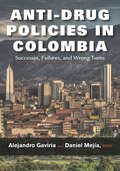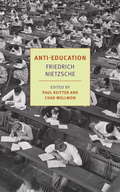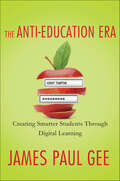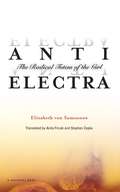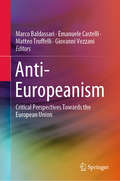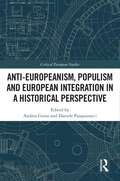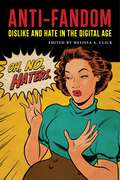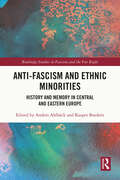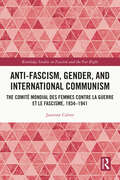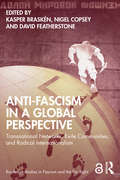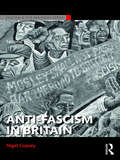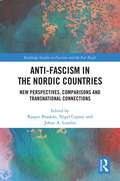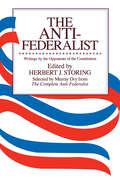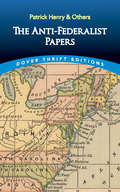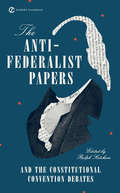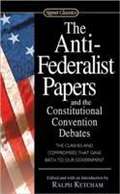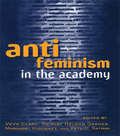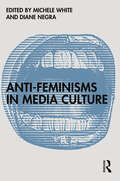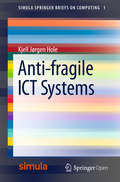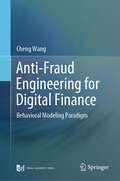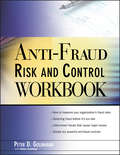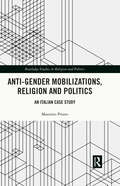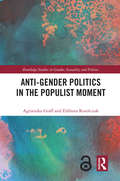- Table View
- List View
Anti-Drug Policies in Colombia: Successes, Failures, and Wrong Turns (Vanderbilt Center for Latin American Studies Series)
by Alejandro Gaviria, Daniel Mejía; translated by Jimmy WeiskopfForty years after the declaration of the "war on drugs" by President Nixon, the debate on the effectiveness and costs of the ban is red-hot. Several former Latin American presidents and leading intellectuals from around the world have drawn attention to the ineffectiveness and adverse consequences of prohibitionism. This book thoroughly analyzes the drug policies of one of the main protagonists in this war. The book covers many topics: the economics of drug production, the policies to reduce consumption and decrease supply during the Plan Colombia, the effects of the drug problem on Colombia's international relations, the prevention of money laundering, the connection between drug trafficking and paramilitary politics, and strategies against organized crime. Beyond the diversity in topics, there is a common thread running through all the chapters: the need to analyze objectively what works and what does not, based on empirical evidence. Presented here for the first time to an English-speaking audience, this book is a contribution to a debate that urgently needs to transcend ideology and preconceived opinions.
Anti-Drug Policies in Colombia: Successes, Failures, and Wrong Turns (Vanderbilt Center for Latin American Studies Series)
by Alejandro Gaviria Daniel Mejia Jimmy WeiskopfForty years after the declaration of the "war on drugs" by President Nixon, the debate on the effectiveness and costs of the ban is red-hot. Several former Latin American presidents and leading intellectuals from around the world have drawn attention to the ineffectiveness and adverse consequences of prohibitionism. This book thoroughly analyzes the drug policies of one of the main protagonists in this war.The book covers many topics: the economics of drug production, the policies to reduce consumption and decrease supply during the Plan Colombia, the effects of the drug problem on Colombia's international relations, the prevention of money laundering, the connection between drug trafficking and paramilitary politics, and strategies against organized crime. Beyond the diversity in topics, there is a common thread running through all the chapters: the need to analyze objectively what works and what does not, based on empirical evidence. Presented here for the first time to an English-speaking audience, this book is a contribution to a debate that urgently needs to transcend ideology and preconceived opinions.
Anti-Education
by Friedrich Nietzsche Paul Reitter Damion Searls Chad WellmonAN NYRB Classics OriginalIn 1869, at the age of twenty-four, the precociously brilliant Friedrich Nietzsche was appointed to a professorship of classical philology at the University of Basel. He seemed marked for a successful and conventional academic career. Then the philosophy of Schopenhauer and the music of Wagner transformed his ambitions. The genius of such thinkers and makers--the kind of genius that had emerged in ancient Greece--this alone was the touchstone for true understanding. But how was education to serve genius, especially in a modern society marked more and more by an unholy alliance between academic specialization, mass-market journalism, and the militarized state? Something more than sturdy scholarship was called for. A new way of teaching and questioning, a new philosophy . . . What that new way might be was the question Nietzsche broached in five vivid, popular public lectures in Basel in 1872. Anti-Education presents a provocative and timely reckoning with what remains one of the central challenges of the modern world.
The Anti-Education Era: Creating Smarter Students through Digital Learning
by James Paul GeeOne of the first champions of the positive effects of gaming reveals the dark side of today's digital and social media Today's schools are eager to use the latest technology in the classroom, but rather than improving learning, the new e-media can just as easily narrow students' horizons. Education innovator James Paul Gee first documented the educational benefits of gaming a decade ago in his classic What Video Games Have to Teach Us About Learning and Literacy. Now, with digital and social media at the center of modern life, he issues an important warning that groundbreaking new technologies, far from revolutionizing schooling, can stymie the next generation's ability to resolve deep global challenges. The solution-and perhaps our children's future-lies in what Gee calls synchronized intelligence, a way of organizing people and their digital tools to solve problems, produce knowledge, and allow people to count and contribute. Gee explores important strategies and tools for today's parents, educators, and policy makers, including virtual worlds, artificial tutors, and ways to create collective intelligence where everyday people can solve hard problems. By harnessing the power of human creativity with interactional and technological sophistication we can finally overcome the limitations of today's failing educational system and solve problems in our high-risk global world. The Anti-Education Era is a powerful and important call to reshape digital learning, engage children in a meaningful educational experience, and bridge inequality.
Anti-Electra: The Radical Totem of the Girl (Univocal)
by Elisabeth von SamsonowA close examination of the relationship between media, art, and the &“Electra complex&” The feminist counterpart to Deleuze and Guattari&’s Anti-Oedipus, Anti-Electra is a philosophy of &“the girl&” as a model of contemporary transgressive subjectivity. Elisabeth von Samsonow asserts that focusing on the girl&’s escape from the Oedipus complex leads to a fundamental shift in our most common views on media and art.Presenting an interpretation of contemporary technics, Anti-Electra argues that technology today encompasses Electra&’s gadgets and toys. According to von Samsonow, satellite drive technologies such as wireless telephones, WLAN, and GPS echo the &“preoedipal constellation&” that the girl specializes in. And with the help of the girl, the cartography of overlapping zones between humankind and animals, as well as between humankind and apparatuses, is redesigned through what the book holds as a &“radical totemism.&” Anti-Electra ultimately offers a new view on gender, the contemporary world dyed by symbolic girlism, and the (universal) girl in critical dialogue with media, ecology, and society.
The Anti-Estrogenic Diet: How Estrogenic Foods and Chemicals Are Making You Fat and Sick
by Ori Hofmekler Rick Osborn• Lower your risk of metabolic disorders, disease, and chronic weight gain • Protect yourself against the estrogenic substances in the environment, products, water, and food Learn how certain foods and herbs can protect you! Estrogenic chemicals—known for causing the near extinction of various living species—are found in some of the most common foods we eat. In this revolutionary diet book, Ori Hofmekler addresses the millions of overweight and obese individuals who have failed or are disappointed with other diets—those who suffer from yoyo dieting, weight gain rebounds, or accumulation of stubborn fat in the belly and other estrogen-sensitive areas. Focusing on our current over-exposure to estrogenic chemicals in the environment, foods, and water,The Anti-Estrogenic Dietprovides a practical solution to fat gain, estrogen-related disorders (PMS, endometriosis, fibrocystic disease), and increased risk of common cancers in women and men (breast, ovarian, cervical, prostate). Allowing you to still enjoy your favorite foods, the program is based on incorporating anti-estrogenic foods, spices, and herbs into your diet, while eliminating estrogenic foods and chemicals. Exposing dietary myths and fallacies, Hofmekler teaches readers that some foods commonly regarded as “healthy” may actually be harmful and vice versa. Special chapters dedicated to readers with different needs and health conditions, recipes, a question-and-answer section, and a list of scientific references are also included in this valuable resource.
Anti-Europeanism: Critical Perspectives Towards the European Union
by Marco Baldassari Emanuele Castelli Matteo Truffelli Giovanni VezzaniThe book analyzes different critical attitudes towards European integration from a multidisciplinary perspective. By applying both quantitative and normative-theoretical approaches, the contributors assess the causes and effects of the popularity of EU-critical positions and doctrines, such as souverainism, neo-nationalism and neo-populism. The book also presents country studies to compare populist movements and parties, such as the Five Stars Movement in Italy, Syriza in Greece and UKIP in the UK. It offers insights into the historical and normative roots of the diverse anti-European standpoints, and the various political demands and agendas connected with these views, ranging from rejections of EU institutions to demands for institutional reforms and propositions for alternative projects.
Anti-Europeanism, Populism and European Integration in a Historical Perspective (Critical European Studies)
by Andrea Guiso Daniele PasquinucciThis book explores the long-term origins of populist Euroscepticism.Taking a historical perspective to move beyond explaining present-day expressions of opposition to the European Union in isolation, this book reveals the historical sedimentation of the several ways and forms taken over decades by opposition towards European integration. As such, this approach – with contributions from across disciplines - explains not just the past of Euroscepticism, but also its current nature and future prospects.This book will be of key interest to scholars and students of European History, European Politics and Studies and more broadly to Political Science, International Relations, the Humanities and Social Sciences.
Anti-Fandom: Dislike and Hate in the Digital Age (Postmillennial Pop #24)
by Jonathan Gray Emma A. Jane Anne Gilbert Louisa Stein Matt Hills Cornel Sandvoss Holly Wilson Holladay Alfred L. Martin Jr. Michelle M Rivera Roberta Pearson Richard McCulloch Whitney Phillips Bethan Jones Bertha Chin Rebecca WilliamsA revealing look at the pleasure we get from hating figures like politicians, celebrities, and TV characters, showcased in approaches that explore snark, hate-watching, and trolling The work of a fan takes many forms: following a favorite celebrity on Instagram, writing steamy fan fiction fantasies, attending meet-and-greets, and creating fan art as homages to adored characters. While fandom that manifests as feelings of like and love are commonly understood, examined less frequently are the equally intense, but opposite feelings of dislike and hatred. Disinterest. Disgust. Hate. This is anti-fandom. It is visible in many of the same spaces where you see fandom: in the long lines at ComicCon, in our politics, and in numerous online forums like Twitter, Tumblr, Reddit, and the ever dreaded comments section. This is where fans and fandoms debate and discipline. This is where we love to hate. Anti-Fandom,a collection of 15 original and innovative essays, provides a framework for future study through theoretical and methodological exemplars that examine anti-fandom in the contemporary digital environment through gender, generation, sexuality, race, taste, authenticity, nationality, celebrity, and more. From hatewatching Girls and Here Comes Honey Boo Boo to trolling celebrities and their characters on Twitter, these chapters ground the emerging area of anti-fan studies with a productive foundation. The book demonstrates the importance of constructing a complex knowledge of emotion and media in fan studies. Its focus on the pleasures, performances, and practices that constitute anti-fandom will generate new perspectives for understanding the impact of hate on our identities, relationships, and communities.
Anti-Fascism and Ethnic Minorities: History and Memory in Central and Eastern Europe (Routledge Studies in Fascism and the Far Right)
by Anders Ahlbäck Kasper BraskénAnti-Fascism and Ethnic Minorities explores how, and to what extent, fascist ultranationalism elicited an anti-fascist response among ethnic minority communities in Eastern and Central Europe. The edited volume analyses how identities related to class, ethnicity, gender and political ideologies were negotiated within and between minorities through confrontations with domestic and international fascism. By developing and expanding the study of Jewish anti-fascism and resistance to other minority responses, the book opens the field of anti-fascism studies for a broader comparative approach. The volume is thematically located in Central and Eastern Europe, cutting right across the continent from Finland in the North to Albania in the Southeast. The case studies in the fourteen research chapters are divided into five thematic sections, dealing with the issues of 1) minorities in borderlands and cross-border antifascism, 2) minorities navigating the ideological squeeze between communism and fascism, 3) the role of intellectuals in the defence of minority rights, 4) the anti-fascist resistance against fascist and Nazi occupation during World War II, as well as 5) the conflictual role ascribed to ethnicity in post-war memory politics and commemorations. The editors describe their intersectional approach to the analysis of ethnicity as a crucial category of analysis with regard to anti-fascist histories and memories. The book offers scholars and students valuable historical and comparative perspectives on minority studies, Jewish studies, borderland studies, and memory studies. It will appeal to those with an interest in the history of race and racism, fascism and anti-fascism, and Central and Eastern Europe.
Anti-Fascism, Gender, and International Communism: The Comité Mondial des Femmes contre la Guerre et le Fascisme, 1934 – 1941 (Routledge Studies in Fascism and the Far Right)
by Jasmine CalverAnti-Fascism, Gender, and International Communism provides a comprehensive history of the Comité mondial des femmes contre la guerre et le fascisme (CMF), an international women’s organisation concerned with confronting the impact of fascism on women and children across the globe. Women played an essential role in the international struggle against fascism during the interwar period, although a focus on the efforts of men and political figures by the historiography has largely overshadowed women’s interventions against right-wing dictatorships. Through an examination of the committee’s key figures, strategies, connections, and campaigns, this book offers a significant contribution to the histories of both women’s activism and anti-fascist activism by positioning the CMF as an important contributor to international political advocacy in the interwar period. Further, the group’s association with international communism and the burgeoning Popular Front movement placed the CMF at the forefront of global debates about the threat posed by fascism and imperialism. This book explores how the professional women activists and the working-class women who populated the organisation developed a committee which advocated for women on a global scale. It charts how the CMF utilised a variety of physical spaces and literary formats to co-ordinate anti-fascist actions through its expansive and ambitious campaigns. The author also demonstrates the close connections between the Communist International and the CMF as a communist front organisation, to provide context for the group’s decision-making and prioritisation of certain campaigns over others. This book will be of interest to scholars of anti-fascism, feminism, women’s history, communism, activism, internationalism, anti-imperialism, and French history.
Anti-Fascism in a Global Perspective: Transnational Networks, Exile Communities, and Radical Internationalism (Routledge Studies in Fascism and the Far Right)
by David Featherstone Nigel Copsey Kasper BraskénThis book initiates a critical discussion on the varieties of global anti-fascism and explores the cultural, political and practical articulations of anti-fascism around the world. This volume brings together a group of leading scholars on the history of anti-fascism to provide a comprehensive analysis of anti-fascism from a transnational and global perspective and to reveal the abundance and complexity of anti-fascist ideas, movements and practices. Through a number of interlinked case studies, they examine how different forms of global anti-fascisms were embedded in various national and local contexts during the interwar period and investigate the interrelations between local articulations and the global movement. Contributions also explore the actions and impact of African, Asian, Latin American, Caribbean, and Middle Eastern anti-fascist voices that have often been ignored or rendered peripheral in international histories of anti-fascism. Aimed at a postgraduate student audience, this book will be useful for modules on the extreme right, political history, political thought, political ideologies, political parties, social movements, political regimes, global politics, world history and sociology.
Anti-Fascism in Britain: Britain In The Inter-war Period (Routledge Studies in Fascism and the Far Right)
by Nigel CopseyAnti-fascism has long been one of the most active and dynamic areas of radical protest and direct action. Yet it is an area of struggle and popular resistance that remains largely unexplored by historians, sociologists and political scientists. Fully revised and updated from its earlier edition, this book continues to provide the definitive account of anti-fascism in Britain from its roots in the 1930s opposition to Oswald Mosley and the British Union of Fascists, to the street demonstrations and online campaigns of the twenty-first century. The author draws on an impressive range of sources including official government, police and security services records, the writings and recollections of activists themselves, and the publications and propaganda of anti-fascist groups and their opponents. The book traces the ideological, tactical and organisational evolution of anti-fascist groups and explores their often complicated relationships with the mainstream and radical left, as well as assessing their effectiveness in combating the extreme right.
Anti-fascism in the Nordic Countries: New Perspectives, Comparisons and Transnational Connections (Routledge Studies in Fascism and the Far Right)
by Kasper Braskén Nigel Copsey Johan A. LundinAlthough the Nordic countries have a reputation for tolerance and social democracy, they were not immune to fascism which spread across Europe in the 1920s and 1930s. This book offers the first comprehensive history of anti-fascism in the Nordic Countries. Through a number of case studies on anti-fascism in Sweden, Finland, Norway, Denmark and Iceland, the book makes a significant contribution to the history of contentious politics in the Nordic Countries and to our broader knowledge of European fascism and anti-fascism. The case studies concentrate on the different manifestations of resistance to fascism and Nazism in the interwar era as well as some of the postwar variants. The book will be of considerable interest to scholars of anti-fascism as well as researchers of Nordic and Scandinavian history and politics.
The Anti-Federalist: An Abridgment of The Complete Anti-Federalist
by Herbert J. StoringHerbert J. Storing's Complete Anti-Federalist, hailed as "a civic event of enduring importance" (Leonard W. Levy, New York Times Book Review), indisputably established the importance of the Anti-Federalists' writings for our understanding of the Constitution. As Storing wrote in his introduction, "If the foundation of the American polity was laid by the Federalists, the Anti-Federalist reservations echo through American history; and it is in the dialogue, not merely in the Federalist victory, that the country's principles are to be discovered." This one-volume edition presents the essence of the other side of that crucial dialogue. It can be read as a genuine counterpart to the Federalist Papers; as an original source companion to Storing's brilliant essay What the Anti-Federalists Were For (volume I of The Complete Anti-Federalist, available as a separate paperback); or as a guide to exploring the full range of Anti-Federalist writing. The Anti-Federalist makes a fundamental source of our political heritage accessible to everyone.
The Anti-Federalist Papers: The Complete Collection Of Articles And Essays Written In Favor And Against The U S Constitution (Dover Thrift Editions: American History)
by Patrick HenryBetween the first proposals of a federal Constitution in 1787 and the document’s 1789 ratification, an intense debate raged among the nation's founding fathers. The Federalist Papers — authored by James Madison, Alexander Hamilton, and John Jay — favored the adoption of the Constitution, but other early statesmen opposed its ratification. The latter group, writing under pseudonyms, amassed a substantial number of influential essays, speeches, and letters that warned of the dangers inherent in a powerful central government. Although never collected in as definitive a form as The Federalist Papers, these statements of opposition appeared in various publications and eventually became known as The Anti-Federalist Papers. Some of their arguments were incorporated into the first ten amendments to the Constitution — the Bill of Rights — but others remained unaddressed. The persuasive and well-argued statements encompassed by this volume continue to provide a valuable and timely perspective on the necessary limits of power.
The Anti-Federalist Papers and the Constitutional Convention Debates
by Ralph KetchamThe complete text of dissenting opinions of those who saw the Constitution as a threat are collected in this volume with Convention debates and commentaries.
The Anti-Federalist Papers and the Constitutional Convention Debates
by Ralph KetchamThe dissenting opinions of Patrick Henry and others who saw the Constitution as a threat to our hard-won rights and liberties. Edited and introduced by Ralph Ketcham.
Anti-feminism in the Academy
by VèVè Clark Shirley Nelson Garner Margaret Higonnet Ketu H. KatrakContending that the anti-feminist backlash in the academy is part of the broader "politically correct" rhetoric, this collection of writers, academics and activists is a much-needed response to the assault on feminist thinkers and critics in the academy today.
Anti-Feminisms in Media Culture
by Michele White Diane NegraThis important and timely collection examines the troubling proliferation of anti-feminist language and concepts in contemporary media culture. Edited by Michele White and Diane Negra, these curated essays offer a critical means of considering how contemporary media, politics, and digital culture function, especially in relation to how they simultaneously construct and displace feminist politics, women’s bodies, and the rights of women and other disenfranchised subjects. The collection explores the simplification and disparagement of feminist histories and ongoing feminist engagements, the consolidation of all feminisms into a static and rigid structure, and tactics that are designed to disparage women and feminists as a means of further displacing disenfranchised people’s identities and rights. The book also highlights how it is becoming more imperative to consider how anti-feminisms, including hostilities towards feminist activism and theories, are amplified in times of political and social unrest and used to instigate violence against women, people of color, and LGBTQIA+ individuals. A must-read for students and scholars of media, culture and communication studies, gender studies, and critical race studies with an interest in feminist media studies.
Anti-fragile ICT Systems (Simula SpringerBriefs on Computing #1)
by Kjell Jørgen HoleThis book introduces a novel approach to the design and operation of large ICT systems. It views the technical solutions and their stakeholders as complex adaptive systems and argues that traditional risk analyses cannot predict all future incidents with major impacts. To avoid unacceptable events, it is necessary to establish and operate anti-fragile ICT systems that limit the impact of all incidents, and which learn from small-impact incidents how to function increasingly well in changing environments. The book applies four design principles and one operational principle to achieve anti-fragility for different classes of incidents. It discusses how systems can achieve high availability, prevent malware epidemics, and detect anomalies. Analyses of Netflix’s media streaming solution, Norwegian telecom infrastructures, e-government platforms, and Numenta’s anomaly detection software show that cloud computing is essential to achieving anti-fragility for classes of events with negative impacts.
Anti-Fraud Engineering for Digital Finance: Behavioral Modeling Paradigm
by Cheng WangThis book offers an introduction to the topic of anti-fraud in digital finance based on the behavioral modeling paradigm. It deals with the insufficiency and low-quality of behavior data and presents a unified perspective to combine technology, scenarios, and data for better anti-fraud performance. The goal of this book is to provide a non-intrusive second security line, rather than replaced with existing solutions, for anti-fraud in digital finance. By studying common weaknesses in typical fields, it can support the behavioral modeling paradigm across a wide array of applications. It covers the latest theoretical and experimental progress and offers important information that is just as relevant for researchers as for professionals.
Anti-Fraud Risk and Control Workbook
by Peter Goldmann Hilton KaufmanProven guidance for fraud detection and prevention in a practical workbook formatAn excellent primer for developing and implementing an anti-fraud program, Anti-Fraud Risk and Control Workbook engages readers in an absorbing self-paced learning experience to develop familiarity with the practical aspects of fraud detection and prevention.Whether you are an internal or external auditor, accountant, senior financial executive, accounts payable professional, credit manager, or financial services manager, this invaluable resource provides you with timely discussion on:Why no organization is immune to fraudThe human element of fraudInternal fraud at employee and management levelsConducting a successful fraud risk assessmentBasic fraud detection tools and techniquesAdvanced fraud detection tools and techniquesWritten by a recognized expert in the field of fraud detection and prevention, this effective workbook is filled with interactive exercises, case studies, and chapter quizzes and shares industry-tested methods for detecting, preventing, and reporting fraud.Discover how to become more effective in protecting your organization against financial fraud with the essential techniques and tools in Anti-Fraud Risk and Control Workbook.
Anti-Gender Mobilizations, Religion and Politics: An Italian Case Study (Routledge Studies in Religion and Politics)
by Massimo PrearoThis book presents an innovative exploration of the rise of political forces that have coalesced around the anti-gender movement, shaping strategies that advocate novel intersections of religion, politicization of gender and sexuality, and radical and populist rejuvenation of conservative ideologies.Through an extensive examination of activist discourses and mobilizations, the author offers a comprehensive political analysis of anti-gender mobilization, encompassing a multidimensional examination of religious, activist, and political opportunity structures. This study unveils three distinct facets characterizing these emerging (Catholic) movements: their relative autonomy from the Church (extra-ecclesiastical), their divergence from conventional religious frameworks (extra-Catholic), and their party-political alignment within the far-right area. The author proposes a new perspective on this burgeoning Catholic cause, contextualizing it within the transnational dynamics underscored by the existing literature. Particularly noteworthy is the scrutiny of internal reshaping within the Italian political Catholicism realm between the 1990s and the 2000s set against the backdrop of the dissolution of the Christian Democratic Party. Through the lens of the Italian landscape, this study extends its analysis to offer broader insights into the contemporary political uses of religion within democracies, along with contentious issues arising from gender and sexuality debates, transcending the confines of the Italian context.This book holds significant relevance for scholars and students engaged in gender studies, religious studies, social movements, populism, political science, political sociology, political history, and Italian studies.
Anti-Gender Politics in the Populist Moment (Routledge Studies in Gender, Sexuality and Politics)
by Agnieszka Graff Elżbieta KorolczukThis book charts the new phase of global struggles around gender equality and sexual democracy: the ultraconservative mobilization against "gender ideology" and feminist efforts to counteract it. It argues that anti-gender campaigns, which emerged around 2010 in Europe, are not a simple continuation of the anti-feminist backlash dating back to the 1970s, but part of a new political configuration. Opposition to "gender" has become a key element of the rise of right-wing populism, which successfully harnesses the anxiety, shame and anger caused by neoliberalism and threatens to destroy liberal democracy. Anti-Gender Politics in the Populist Moment offers a novel conceptualization of the relationship between the ultraconservative anti-gender movement and right-wing populist parties, examining the opportunistic synergy between these actors. The authors map the anti-gender campaigns as a global movement, putting the Polish case in a comparative perspective. They show that the anti-gender rhetoric is best understood as a reactionary critique of neoliberalism as a socio-cultural formation. The book also studies the recent wave of feminist mass mobilizations, viewing the transnational revolt of women as a left populist movement. This is an important study for those doing research in politics, cultural studies, gender and sexuality studies and sociology. It will also be useful for activists and policy makers.
